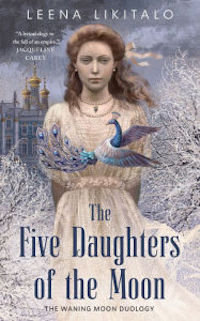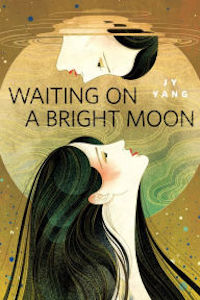By the time this column goes live, I’ll probably be in transit. I’m heading to Uppsala in Sweden for the Reception Histories of the Future conference, helmed by Dr. AnnaLinden Weller, also known as Arkady Martine, where I’ll be participating in discussion sessions and giving a paper. Soon after, I’ll be moving on to Helsinki in Finland for Worldcon, where I’m supposed to take part in at least three panels.
I expect to spend quite a lot of time wandering around feeling lost and lonely and looking for conversations. Large gatherings of people are terrifying.
This week I want to talk about two recent works, one by Finnish writer Leena Likitalo, and one by Singapore-based J.Y. Yang. It seems fitting to talk about the works of international writers as I head off to the Worldcon, somehow.
Likitalo’s The Five Daughters of the Moon is her debut novel. It’s a striking first effort, the opening volume in a duology: atmospheric, evocative, and filled with interesting women.
 It’s told from the perspective of the titular five daughters of the Moon. Well, theologically they’re the daughters of the Moon, but biologically speaking, they’re the daughters of the Crescent Empress and her lovers. The daughters range from six-year-old Alina, who sees things that other people don’t, and spends most of the time afraid, to twenty-two-year-old Celestia, her mother’s heir. In between are eleven-year-old Merile, who loves her pet dogs, feels helpless, and tries to be a good sister to Alina; fifteen-year-old Sibilia, whose shallow immaturity—she’s just fallen in love for the first time, and she really wants the elaborate balls she’s looking forward to when she turns fifteen—seems like a thin layer over a deep well of lonely isolation and lack of purpose; and sixteen-year-old Elise, in love with a dashing captain and the idea of revolution, sneaking out with him to learn about the poverty in her mother’s capital and selling her gowns and jewellery to fund “the cause.”
It’s told from the perspective of the titular five daughters of the Moon. Well, theologically they’re the daughters of the Moon, but biologically speaking, they’re the daughters of the Crescent Empress and her lovers. The daughters range from six-year-old Alina, who sees things that other people don’t, and spends most of the time afraid, to twenty-two-year-old Celestia, her mother’s heir. In between are eleven-year-old Merile, who loves her pet dogs, feels helpless, and tries to be a good sister to Alina; fifteen-year-old Sibilia, whose shallow immaturity—she’s just fallen in love for the first time, and she really wants the elaborate balls she’s looking forward to when she turns fifteen—seems like a thin layer over a deep well of lonely isolation and lack of purpose; and sixteen-year-old Elise, in love with a dashing captain and the idea of revolution, sneaking out with him to learn about the poverty in her mother’s capital and selling her gowns and jewellery to fund “the cause.”
Each chapter in turn is told from the point of view of a different sister. We see the gagargi (a kind of priest) Prataslav display his Great Thinking Machine, and we watch as each of the sisters see some part of the threat he poses to their mother’s rule. For Prataslav is the leading force behind the revolution that will become a coup, and he has ruthlessly used Celestia, manipulating her and even taking part of her soul to render her more suggestible and compliant. With the revolution in progress, the sisters are loaded on a train and sent away—either to prison, or to an exile, they do not know which. Will they manage to survive and escape?
The setting is strongly influenced by the last days of Tsarist Russia. The worldbuilding that includes a “thinking machine” and magic fuelled by souls. The Five Daughters of the Moon retains a persistently haunting, fairy-tale-like quality. It feels simultaneously both realistic and like a parable.
Likitalo shows great deftness with characterisation. Each of the sisters comes across as a distinct, and distinctly compelling, individual. Her prose, too, is precise, with a talent for the telling line.
It’s a great debut, and I really liked it. I’m looking forward to seeing what happens next.
 JY Yang’s “Waiting on a Bright Moon” is a quiet and touching novelette about love, war, treason, rebellion, human connection and hope—it packs a lot into its relatively short space—set in a space empire where planets are connected by song magic.
JY Yang’s “Waiting on a Bright Moon” is a quiet and touching novelette about love, war, treason, rebellion, human connection and hope—it packs a lot into its relatively short space—set in a space empire where planets are connected by song magic.
It’s told in the second person present tense. This is sometimes a disconcerting stylistic choice—in some hands it feels like stunt writing, flashy for the sake of flash—but in Yang’s novelette it brings immediacy and urgency, a strong sense of connection to the main character and an instant, disconcerting alienation. This is a very different world, where women who (are found to) love women are trained as ansibles—and treated as replaceable equipment—in order to keep the far-flung space empire connected.
This is the story of Ansible Xin—once named Tian—and how she falls in love with the starmage Suqing—Officer Ouyang—who, it transpires, is wrapped up in revolution.
Yang’s world is vivid, filled with striking images and emotion. Their characters, too, are striking: Yang sketches their lives and personalities in deft strokes. This is a very compelling novelette. It may be one of my favourites.
But then, I do have a weakness for space empires and weird space magic. And everything is better with lesbians.
Liz Bourke is a cranky queer person who reads books. She holds a Ph.D in Classics from Trinity College, Dublin. Her first book, Sleeping With Monsters, a collection of reviews and criticism, is out now from Aqueduct Press. Find her at her blog, where she’s been known to talk about even more books thanks to her Patreon supporters. Or find her at her Twitter. She supports the work of the Irish Refugee Council and the Abortion Rights Campaign










